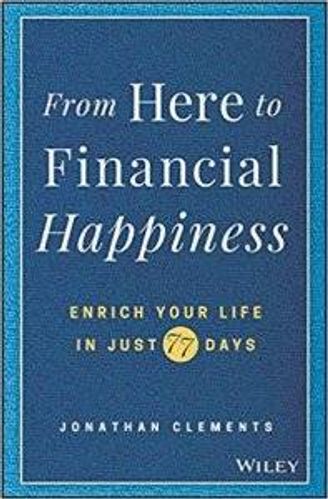Get Your Finances on Track in Under 10 Minutes a Day
Advice from Jonathan Clements, author of 'From Here to Financial Happiness'
Personal finance writer Jonathan Clements says you can build a happier, more prosperous financial life just by spending five or 10 minutes a day for 77 days — less than three months. Dubious? I confess I was until I read his new book on how to do it, From Here to Financial Happiness: Enrich Your LIfe in Just 77 Days. Now, I’m a convert, especially when it comes to people in their 50s and 60s who are nearing, or in, retirement and want to get their finances on track.

I recently interviewed Clements — the former Wall Street Journal personal finance columnist, founder of HumbleDollar.com and author of seven (!) other personal finance books — to learn more about his 77-day system. Clements isn’t saying that you can achieve financial independence in 77 days. “That takes years and years of diligently saving and arranging to make extra payments on your mortgage,” he told me. “But in 77 days you can figure out where you want to go financially and what steps you need to take. That’s what the book endeavors to do.”

Here are highlights from my interview with the author, where he talks about ways to simplify your investments, the types of financial products to avoid and who can be helped by using a financial adviser.
Next Avenue: Why does the world need another personal finance book? What did you hope to do with yours that makes it different from others?
Jonathan Clements: There are tons of books out there devoted to the basics of saving, investing, insurance, estate plans, and debt management. So at this point, to learn the basics of personal finance, all you have to do on Google is type a few keywords. The real problem is getting ourselves to do it. It’s not about education; it’s about behavior change. What I hope the book will do is help people change their behavior.
Two things I focus on in the book are to make people excited about their goals and to get people to write down what they need to do. If we make our goals more exciting, we’re more willing to make sacrifices in the short term. When people make a commitment to themselves in black and white, by writing it down, and see what they promised to do, that helps make people change behavior.
Your book is for people of any age, but do you think there’s anything especially useful about the 77-day plan for people in their 50s and 60s?
A lot of people, when they reach retirement age, have a notion that their financial life stops at that point and they’ll no longer buy new cars or purchase new homes. That’s simply not the case. These practical personal finance decisions still happen. We need to prepare financially for retirement and think hard about what we’ll do with all the free time. You don’t want to end up with a miserable retirement.
You say the goal isn’t to beat the market, prove how clever we are or become the wealthiest family in town. It’s to have enough to lead the life we want. Why is that the most important goal?
We only get one shot and we don’t want to mess it up. If we spend our days making crazy trades in the market and taking huge amounts of risk in an effort to get rich, we’ll fail miserably. Instead, you want to focus on managing your financial life so you have a high likelihood of success. That doesn’t mean you should avoid stocks or take no risks. You should be prudent in the way you take risks, so you have the ability to lead the life you want.

I expect the reason that people tend to favor index funds as they grow older, after decades of making one mediocre investment decision after another and realizing they’re not improving returns with actively-managed mutual funds [where a fund manager chooses stocks to buy and sell] and individual stocks is that they decide maybe they’ll just settle for market-average results.
How did you decide which steps people should take which days?
Early on, I deal with the financial basics: trying to make sure you’re not drowning in debt; that you’re putting enough in your 401(k) to get the employer match; that you never have a scary credit card balance. And early on, there’s an emphasis on what you do want from your financial life.
As the book progresses, I deal with practical elements of managing money, with a big emphasis on saving for retirement. It’s the one goal that isn’t optional. You don’t have to pay for your kids’ college or own a house, but one day almost all of us are going to retire and that will require a substantial amount of savings. So that goal should be a priority. You also want to have a safety net, with insurance and emergency funds. Then you can focus on other goals.
The back end of the book has practical aspects of putting together an investment portfolio and there are a few days devoted to estate planning.
Let’s talk about your advice on investing: For Day 14, you say ‘Keep It Simple.’ What do people do wrong when it comes to investing and how can keeping it simple help them?
There’s widespread belief out there that the more sophisticated your strategy, the higher returns you’re likely to get. It simply isn’t true. Sophistication is an excuse for Wall Street to charge you high fees, which means your returns are likely to be substantially lower. Complexity is the enemy of the individual investor.
And because of that, there are a whole bunch of investment products you should have nothing to do with: you don’t want to be buying variable annuities or cash value life insurance as an investment, or options and futures. They all involve high costs.
You’re much better off with simple products: buy index funds; CDs from banks; Treasury bonds from the government. Put retirement money in Roth IRAs and 401(k)s. Do these things long enough and one day you’ll wake up and be astonished how much you have accumulated.
You recommend building an investment portfolio using three core index funds: a U.S. stock market index fund; a U.S. bond market index fund and a total international stock index fund. Why? And what percentage of that portfolio should be in each, for people in their 50s and 60s?
In finance, the notion of a global market portfolio consists of four sectors that are equal in size: U.S. stocks, U.S. bonds, foreign stocks and foreign bonds. I’d drop foreign bonds from the list because if you’re saving for retirement, you don’t want to take much currency risk. But you should own the other three.
In terms of allocation, retirees might go for 50 percent in bonds, 25 percent in U.S. stocks and 25 percent in foreign stocks. Pre-retirees might have 70 to 75 percent in stocks and ease out of them down to 50 percent over the next 15 years. If you’ll get a traditional pension or if Social Security will cover much of your monthly expenses in retirement, you don’t have to take the stock allocation down that low.
The allocation for foreign stocks is high compared with what others suggest, but my thinking is this: If you believe markets are reasonably efficient, investors worldwide have decided that U.S. stocks count for half of the global stock market. To piggyback on the collective wisdom of all investors means having 50 percent [of your stock portfolio] in U.S. stocks and 50 percent in foreign stocks.
Even then, the voice in the back of my head says: ‘What if the U.S. stock market has terrible performance over the next 10 years?’ That’s almost unthinkable today; people assume the U.S. stock market is a machine that spits out great returns one year after another. But the fact is U.S. stocks are pretty expensive now. If the U.S. stock market has wretched returns over the next decade, anyone who is largely, or entirely, in it will be super disappointed. I don’t want to get derailed by a terrible U.S. stock market.
And you also have an alternative approach: a single target-date retirement fund that invests in the company’s own index funds, such as ones from Schwab, Fidelity and Vanguard. Why do you suggest this and who might be better off doing this versus buying the three funds?
Target date index funds are great for people who worry too much about investing and tend to get freaked out by market volatility. With a target date fund, all you see is a single share price that bounces up and down relatively sedately. By comparison, with the three funds approach, you will see much more of the market’s day-to-day carnage. For investors, that may be unnerving.
What’s your view of robo-advisers that automatically manage investments for people?
I think robo-advisers are great for people whose only concern is investing and who are not worried about larger personal finance issues. I’m not sure robo-advisers offer anything that special compared to buying target-date funds on your own, though.
The ability to add value in the investment arena is very limited; that’s why so much money has moved out of actively-managed funds. And robo-advisers are playing to that. But what’s missing is the flip side: there is great value in having a financial planner to help you with other areas of personal finance — figuring out whether to pay down debt, making sure you have the right estate documents and the right insurance and that you own the right-size home. A good financial planner can add a lot of value.
You suggest looking for a fee-only financial planner [one who doesn’t charge commissions] if you have more than $250,000 in savings and your finances are complicated or you can’t get the job done on your own. Why?
It’s pretty hard to find a fee-only planner who will take you on if you have less than $250,000 to invest. Not that it wouldn’t be valuable to have one; it’s simply that most advisers won’t take you on. There are some who charge by the hour and I’m a fan of that model, but there aren’t that many hourly advisers out there.
And by 'complicated,' I mean that life becomes more complicated once you are married and have children, if you’re trying to help your elderly parents, you’re self-employed, you’re approaching retirement and thinking about Social Security and whether you need long-term-care insurance and whether you should move.
You have tips for people who don’t have the financial wherewithal to deal with a prolonged period of unemployment. One is to set up a home equity line of credit and another is to fund a Roth Individual Retirement Account. Why can they be helpful?
A Roth IRA can provide you with a financial backstop because you can withdraw your original contributions at any time without owing taxes or penalties. And a home equity line of credit can let you tap into the value of your home at relatively low cost.
Any advice about relocating for retirement?
One of the things we know from research is that spending time with friends and family is hugely important. I would strongly resist heading to a warmer climate that puts you far away from friends and family in retirement. A great study a few years ago said the boost to longevity that comes with having robust friends and family is roughly equal to not smoking. That’s why I keep telling my wife we’re not moving to Florida.
Have you done all the things you suggest people do in 77 days? If not, which are you working on or do you plan to?
I would confess to not doing a couple of things. I mention toward the end of the book that as you get older you should probably have powers of attorney for finances and health care; somebody who can make decisions for you when you can’t. I have not done that. Guilty as charged.
And I have a more complicated portfolio than I would recommend to others. I think these investments will pay off over the long haul, but I probably could have saved myself some mental exhaustion by not bothering with them.


